
Mission Statement:
"To advance through research, education and symposia, an increased public awareness of the Cape Fear region's unique history."

Pender County Born of Reconstruction Politics
Cape Fear Historical Institute Papers
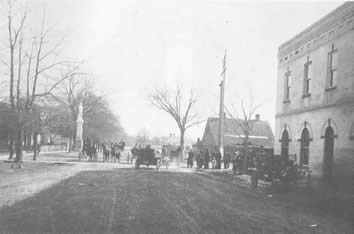
Wright Street in Burgaw, looking Southward
The Creation of Pender County, 16 February, 1875
Current-day Pender county was created out of the northern
two-thirds of New Hanover county in 1875, the result of
continued political unrest between conservative North
Carolinians and the postwar Republican carpetbag regime
in the lower Cape Fear region.
After Conservatives (later Democrats) won control of the
North Carolina General Assembly (from northern Republicans)
in 1870, they could not return the State to full local
control as the Republicans still held the national government;
but they retained judicial and executive dominance along with
strong representation in the State legislature.
Realizing that the black vote ensured Republican
control and corruption in the Cape Fear region, Conservatives
determined that reducing New Hanover County representation
in the State legislature was a better strategy. They hoped to
control Pender County and its legislative delegation once the
blacks, mostly sharecroppers, were separated from the Republican
political organization in Wilmington.
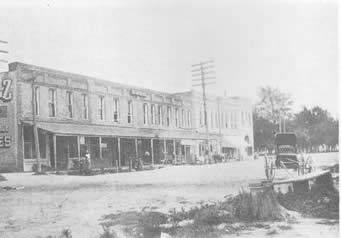
Burgaw in Late 1800's
The Franklin Township of northern New Hanover (now Pender)
had a large population of freedmen after the war and "most had been organized into the Republican Party by carpetbaggers (northern
political opportunists) and threatening control of New Hanover"
county governance. (Bizzell).
To address this concern, a portion of Franklin Tonwship was ceded to
adjacent Sampson County in 1870 - and the remainder given
in 1872 thus establishing the current County boundary.
As Sampson County had a small former-slave population and little
Republican influence, the removal of Franklin seemed a good move
for New Hanover County conservatives. Oscar Bizzell's
"Heritage of Sampson County," mentions "Dr. Cornelius Tate
Murphy (1827-1881) of Taylors Bridge Township and Clinton [who] represented Sampson in the State Senate during 1870-1872 and
probably instrumental in engineering this deal."
On the State level, Conservative victory brought an end to Republican
excesses in finances by repudiating most of the $30,000,000 State
debt, of which about $13,000,000 consisted of special tax railroad
bonds issued in 1868-1869. Most of this money had been wasted
and the bonds regarded as fraudulent, unconstitutional
and needing repudiation.
The Republicans in Wilmington were former US Army officers and
political opportunists from the north after the city's capture in February 1865. Though a majority white population before the war, the city
became majority black after the arrival of many refugees left homeless
in the path of Sherman's destruction of plantations. The new
Freedmen’s Bureau drew black refugees here as well.
The city population in 1860 consisted of 5200 white, and 575 free
black residents, plus 4300 black slaves. The changes above brought
the population in 1870 to 5526 white, and 7920 black residents.
By the year 1880, the city population was 8159 white and 13,217
(61%) black in an increasingly racially-polarized political environment.
The white citizens comprised the vast majority of property holders,
yet had little political representation as the black residents voted
solidly for Republican office holders. This was the racial and political climate which led to the 1898 bloodshed in Wilmington.
(The following period document is offered for perspective)
HISTORY OF PENDER COUNTY NORTH CAROLINA
MATTIE BLOODWORTH - 1947
The Reconstruction Period
"After Congress passed the Reconstruction Act, which was one
of the most drastic and tragic ever recorded in the history of
this country, crime and riotous living spread its dark pall over
this quiet peaceful land. Wilmington the County Seat was crowded with carpet-baggers, scalawags, and Negroes. Negro constables, Negro deputy sheriffs, Negro health officers and for many years
a Negro served as Register of Deeds; also a Negro represented
New Hanover in the Legislature.
These Negroes and scalawags owned no property and were not interested in much of anything beyond the idea of exploiting the
white property owners. The Negroes were very ignorant and
strongly prejudiced against their former masters, and in no way qualified to take part in government affairs. The so-called
scalawag and carpet-bagger occupied the important positions
with the Negroes in the minor places. The white man was,
so to speak, disfranchised, and the former leading families
were in many instances practically bankrupt, the great
plantations lay idle, neglected, and everything and
all business was demoralized.
Poverty stalked the land and New Hanover County, which then comprised the present Pender, found life almost intolerable.
This condition existed until 1898, when a revolution changed the whole aspect and the Reconstructioners faded into discard where
they have since remained, a negligible element. Under such
conditions the Democratic Party inevitably became the party
of “White Supremacy,” the party of decency in government
and honesty in affairs.
To secure control of the County & State government and to regenerate it, was the consuming passion of the Democratic Party.
In those days it was impossible to elect a decent white man - a Democrat - to the Legislature, either from New Hanover or from
this section. The thousands of voting Negroes in the city of Wilmington piled up a majority so large that it could hardly be overcome by any artifice, so when the County of Pender had been created the politicians were solely disappointed.
Alfred L. Lloyd, a noted Negro, was promptly sent to the
Legislature from the new County of Pender. His majority was
a slight one and was soon overcome, and Pender County
shortly after became a reliable “White County.”
Since that time Pender has been constant in its loyalty to the Democratic Party, to decency in government, and to honesty
in public affairs.
While this great War Between the States, with its terrible slaughter
of life, inflicted a severe blow to this section, Pender has emerged from this period slowly, but substantially, and is fast becoming
one of North Carolina's greatest farming sections."
The New County of Pender Is Formed:
The bill to form a new county from the northern two-thirds
of New Hanover was introduced in the North Carolina Legislature in January 1875 by John D. Stanford, Democratic senator from Duplin County. Comprising almost all of New Hanover’s agricultural
population, the new county would reduce the former to little more
than Wilmington proper “plus an almost uninhabited peninsula.”
“Stanford introduced the bill because the “petitioners had no representative of their political faith on the Senate floor.”
According to Stanford the petitioners desired “to be free
from Radical rule and corruption which had . . . impoverished
the county of New Hanover.” They “wanted to be cut loose
from the Radical ring of Wilmington.” Even though the
Republicans would have a slight majority in the proposed
new county, they opposed its creation.” (McDuffie, Politics in Wilmington and New Hanover County, 1865-1900)
The legislative act creating Pender County was ratified on
February 16, 1875, and called for an election to be held on
the third Thursday of April, 1875 to elect a Clerk of the Superior
Court, a Sheriff, a Treasurer, a Register of Deeds, a Surveyor,
five commissioners and a Coroner. All those elected were to
"hold office until th 1st Thursday in August 1875 or until
their successors shall have been elected."
The act provided that New Hanover County would have two members elected to the House of Representatives and Pender County, one
member. Both counties were to elect one State senator.
The new county commissioners of Pender were directed by the
North Carolina Legislature to convene their first official meeting
on the fifth Thursday of April, 1875 at Rocky Point, with the
county seat being at the town of Cowan, but an act of 1877
directed that it should be named “Stanford” after the bill’s sponsor.
Robert J. Nixon, Fletcher H. Bell, James Garrison, K. Bryan and
John D. Powers were appointed Commissioners for the purpose of confering with New Hanover County commissioners regarding the
ratio of New Hanover debt to be asumed by the new county.
The first County Commissioners elected in Pender County were
W.H. French, C.H. Manning, A.V. Horrell, Daniel Shaw and
Miles Armstrong. The town of South Washington was named as
the County Seat after an official vote of April 15, 1875.
The first regular meeting of the commissioners was at
South Washington on May 3, 1875.
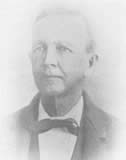
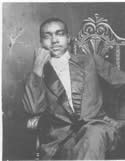
Commissoners Daniel Shaw and Miles Armstrong
In November 1876 a new Board of Commissioners was elected
consisting of Miles Armstrong, Augustus Gemberg, Robert M. Croom, Elijah Tate, and C.M.D. Humphrey.
The County Seat was moved to the town of Burgaw in the spring
of 1879, and an act of the General Assembly in 1879 changed
the formerly required name ”Stanford” to Burgaw. The community
of Burgaw appears on maps as early as 1861, and is named
for Burgaw Creek, which appears on the Collett map of 1770.
Also, a Burgaw Plantation in the vicinity appears
in records of 1764.
The reunions of Southern soldiers who fought in the War Between
the States was common in the postwar period, and Pender County
hosted its own. Below is a group photograph of an 1896
Reunion held in Burgaw.

The county is named in honor of Edgecombe County native
Major-General William Dorsey Pender (1834-1863). Born near
Tarboro he entered West Point as a cadet in July 1850 and rose to the rank of major-general by age 29. Considered one of the most capable officers in Lee's army, the latter wrote of him: "His promise and
usefulness as an officer were equalled only by the purity and excellence
of his private life." Severely wounded at Gettysburg in July 1863,
he died shortly after.
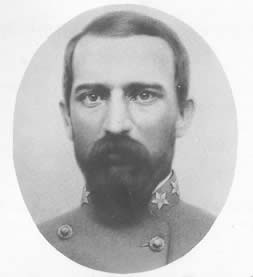
Major-General William Dorsey Pender
General Pender's body as taken to Tarboro and buried in the
churchyard of Calvary Parish. His headstone is inscribed with
"Patriot by Nature, Soldier by Training, Christian by Faith."
Inside the church, a window memorializes Pender with his
favorite quote from St. Paul:
"I have fought a good fight, I have kept the faith."
The new county name had been the suggestion of resident
Dr. Elisha Porter, who had served during the war as an army physician under General Pender.
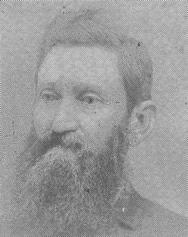
Dr. Elisha Porter
Sources:
The Formation of the North Carolina Counties, 1663-1943,
D. L. Corbitt, NC Dept. of Archives & History, 1950
North Carolina Gazetteer, William S. Powell
UNC Press, 1980
Wilmington and New Hanover County Politics, 1865-1900,
Jerome McDuffie, Kent State University, 1979
The Heritage of Sampson County, North Carolina, 1784-1984
Oscar M. Bizzell, Editor, SCHS, 1983
Pender County Centennial, 1875-1975
Centennial Booklet Steering Committee, Pender County
©2006 Cape Fear Historical Institute